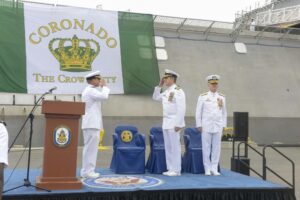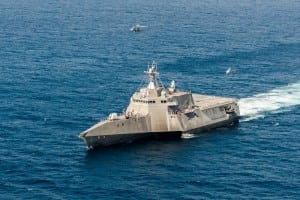The Navy decommissioned the Independence-variant Littoral Combat Ship (LCS) USS
Coronado in a ceremony at San Diego on Sept., 14 after only eight years of service.
The Navy characterized LCS-4 as a test and training ship that helped determine the operational configuration and deployment capabilities of later LCSs.

“Today we recognize the great contribution Coronado and its crew made in developing the operational concepts foundational to the current configuration and deployment of Littoral Combat Ships. Thanks to Coronado, the future of LCS looks bright,” Rear Adm. Wayne Baze, commander of Expeditionary Strike Group 3, said during the ceremony.
LCS-4 is the third LCS the Navy decommissioned, requested along with others in the Fiscal Year 2022 budget request. It follows the USS Independence (LCS-2), the first of the variant, which was decommissioned in 2021. LCS-2 was also called a test and training ship (Defense Daily, July 30, 2021).
The service’s Fiscal Year 2023 budget request sought the ability to retire another nine Freedom-variant LCSs due to both the cost of fixing the combining gear on delivered ships and the cancellation of the anti-submarine warfare mission package due to problems in its development (Defense Daily, April 25).
The aluminum trimaran-designed Independence-variant LCS-4 was built by Austal USA at its Mobile, Ala., shipyard under prime contractor General Dynamics [GD] as part of the original LCS competition along with the first two Freedom-variant LCSs built by Fincantieri Marinette Marine for Lockheed Martin [LMT]. Since regular production started, Austal USA became the prime contractor for the Independence-variant LCSs.
The Navy commissioned LCS-4 on April 5, 2014 at Naval Air Station North Island, San Diego. It then deployed in 2015 to the 7th Fleet for an initial deployment to the western Pacific for 18 months.
The Navy said after being decommissioned LCS-4 will be designated as an “Out of Commission, In Reserve” (OCIR) asset.
While deployed in the Pacific, LCS-4 conducted targeting exercises with an embarked Northrop Grumman [NOC] MQ-8B Fire Scout, completing initial operational test and evaluation off the coast of southern California (Defense Daily, July 9, 2018).

The USS Coronado also demonstrated the Kongsberg and Raytheon Technologies [RTX] Naval Strike Missile in 2014, one of several over the horizon missile assets it tested.
“While deployed, Coronado supported presence operations and maritime security operations to include the advancement of the LCS manned-unmanned teaming concepts through successful targeting exercises with an embarked MQ-8B Fire Scout. The ship’s successful operations demonstrated the relevance of LCS as a platform that provides flexible options and tactical advantages,” the Navy said in a statement.
“Today we recognize the great contribution Coronado and its crew made in developing the operational concepts foundational to the current configuration and deployment of Littoral Combat Ships,” said Rear Adm. Wayne Baze, the ceremony’s guest speaker and commander of Expeditionary Strike Group 3. “Thanks to Coronado, the future of LCS looks bright.”